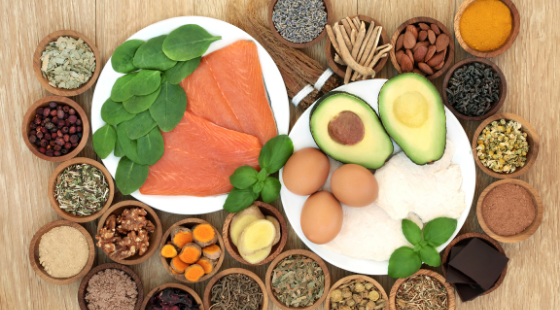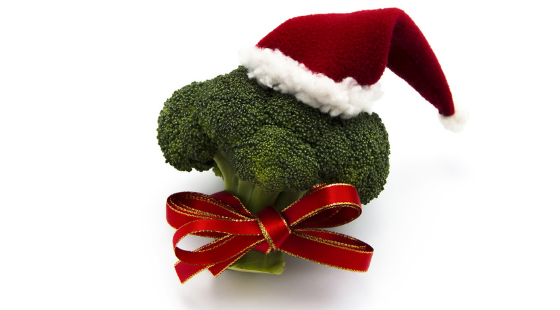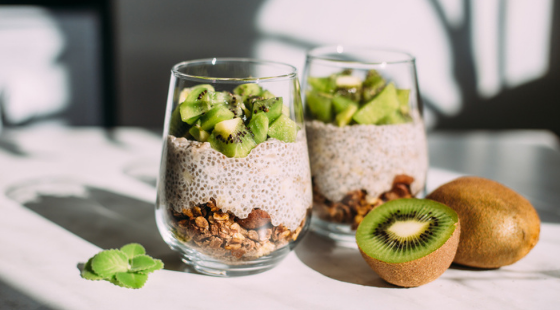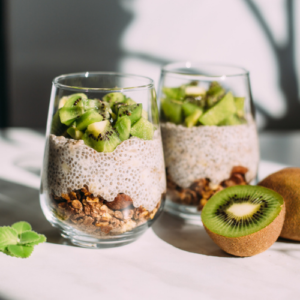
Top 10 Foods To Reduce Anxiety

Current polls suggest that as many as 4 in 10 Canadians are experiencing anxiety. The mental and emotional toll anxiety can take on a person can be significant, and the physical symptoms that can come from having anxiety can also be uncomfortable and unpleasant – headaches, nausea, chest pain or shortness of breath, restlessness and insomnia, fatigue, and poor immune function are just some of the physical manifestations of anxiety. In short, many Canadians are suffering.
Thankfully, as we covered in a recent blog post, there are simple dietary and lifestyle habits that can be implemented to help reduce anxiety. In this blog post, we’ll be exploring our Top 10 Foods to potentially help you get some relief from your anxiety symptoms.
Eggs
Eggs are one of the most economical food sources of Vitamin D3, the sunshine vitamin. Optimizing Vitamin D has been shown to be effective at reducing the symptoms of anxiety (1). Plus, they are protein-packed, which can help promote balanced blood sugar levels, which in turn promotes a more even mood. If you’ve ever been “hangry”, then you’ve experiences some of the mood instability that can occur with poorly managed blood sugar levels. Consuming adequate amounts of protein-rich foods such as eggs, is one step toward controlling blood sugar levels.
Eggs also contain an important amino acid, tryptophan, used to make serotonin in the body. Serotonin is an essential neurotransmitter that regulates mood, sleep, memory and behaviour. And as if all that wasn’t enough, eggs also offer a large dose of choline, an essential nutrient that supports brain and nervous system function, including mood and memory.
Boiled eggs are an easy food to keep on hand to slice and toss on a salad, or just peel and eat for a snack when you don’t feel like cooking. Boiled eggs can be stored in the fridge, for 7 days in the fridge, so make a batch for the week and this will be a great grab and go snack. You can also use eggs in baked goods, frittatas or quiches, omelettes and more!
Salmon
Studies have shown that salmon consumption three times per week can significantly decrease anxiety. (2) Salmon is not only delicious and another good source of vitamin D, it’s also full of healthy, brain-building omega-3 fats! Consuming adequate amounts of EPA and DHA may also promote your brain’s ability to adapt to changes, allowing a person to better handle stressors that can trigger anxiety symptoms. (3) Salmon also contains Vitamin B12 which helps convert amino acids (the building blocks of protein) into neurotransmitters that send messages within our brain and nervous system and help regulate many functions including mood.
If you are not a big fan of consuming fish, take an omega-3 supplement. Researchers found that people who took high doses of omega-3s (up to 2,000 mg a day) seemed to have the most reduction in anxiety symptoms. (4)
Salmon is enjoyable baked, fried, or barbequed! Plus, we have several sources of recipe inspiration to get you cooking up more salmon, including Salmon Avocado Toast, Smoked Salmon Egg Cups, and Salmon Chowder.
Spinach
Increasing your intake of fruits and vegetables can improve feelings of wellbeing in as little as 2 weeks! (5) In one study, participants who were given three extra servings of fruits and vegetables per day for just two weeks felt improvements in their vitality and motivation, although the study authors note that longer-term intervention is necessary to impact anxiety levels. Focussing on consuming a variety of nutrient dense plant foods is a cornerstone of solid nutrition that, in turn, supports our body and mind.
Spinach is high in dietary fibre, which, along with protein and healthy fats, assists in balancing blood sugar levels. Generally speaking, with more stable blood sugar levels come more stable moods. (6) Spinach is also rich in B-vitamins, which are known to support nervous system functioning, brain health, and boost energy levels.
While spinach is a great option… don’t forget about other leafy greens such as kale, beet greens, Swiss chard, bok choy, cabbage, and collards. These leafy green vegetables have many of the same nutritional benefits!
Turmeric
Curcumin, the bioactive compound found in the culinary spice turmeric, is a powerful anti-inflammatory. In studies, curcumin has been shown to be as effective at reducing anxiety, depression, and PTSD symptoms as leading SSRI prescription medications. (7) It is believed that curcumin may help boost serotonin and dopamine, two of our “feel good” neurotransmitters.
Turmeric is well-know for it’s distinct flavour in curries, like our Coconut Chicken Curry and Zoodles, whereas, the extract curcumin, is available in many supplement forms.
Jicama
Jicama is a low calorie tuber, native to Mexico and Central America. It has all the comforting feeling of other starches (like potatoes), but without spiking blood sugar levels, which as you’ll recall from above helps maintain a more even mood!
Jicama also contains inulin, a fibre that supports gut health by feeding the good bacteria in our intestinal tract. Our gut and brain are intricately connected via a pathway dubbed the “gut-brain axis”. When attempting to reduce anxiety symptoms, it is imperative to strengthen gut health as an unhealthy gastrointestinal system can be a cause of anxiety. (8)
If jicama isn’t available in your area, other healthy, slow-digesting carbohydrate options include sweet potatoes, winter squashes, beets and turnips.
Sardines
For many of you, including sardines in your diet may mean trying something new! Like other oily fish, sardines contain large amounts of omega-3 fatty acids. You brain is made of approximately one third Omega-3 fats. So, to keep your brain functioning well, consuming Omega-3s is critical! In addition to omega-3s, sardines contain Vitamin D, Vitamin B12 and the antioxidant mineral selenium. Studies show the lower the levels of selenium in the diet, the higher the reports of fatigue and mood disorders such as anxiety and depression. (9)
Making a paté is an easy and tasty way to introduce yourself to sardines!
If you aren’t interested in sardines, other oily fish include mackerel, herring, and Arctic char.
Cashews
In addition to containing a blood sugar balancing combination of proteins, fats, and fibre; cashews also contain an important amino acid called typtophan. Tryptophan is used within our body to create the neurotransmitter serotonin, which helps boost mood in folks with both depression and anxiety.
Most nuts have brain-boosting omega-3 fats and antioxidant vitamin E. Anxiety is believed to be correlated with overall lower levels of antioxidants. (10) The vitamin E in cashews and other nuts, is the most abundant fat-soluable antioxidant in the human bodies, so optimizing our intake of this vitamin may improve our overall antioxidant status, and therefore reduce anxiety levels.
Cashews are a great snack option, because you can just grab them and go! Cashew butter is delicious as a fruit or vegetable dip, as the base of creamy sauces or salad dressings, and in granola or these Coconut Yogurt Clusters. If you don’t love cashews, you could reach for almonds, pecans or walnuts instead!
Sauerkraut
We’ve written in more depth about the connection between gut health and mood, here and here. But for the purposes of this blog post, suffice it to say, probiotics and the fermented foods that provide them, are key to the health of our digestive system – which is where we manufacture 95% of our serotonin! You may recall from above that serotonin is the neurotransmitter believed to regulate anxiety, happiness and mood, among other things.
If sauerkraut isn’t your favourite, other naturally fermented foods such as pickles, pickled carrots or beets, kimchi, and yogurt also boast probiotic benefits. We recommend trying to include some type of fermented food daily. A scoop of sauerkraut with dinner, some kefir in a smoothie, maybe a tablespoon of kimchi on your salad, or some pickle juice in a salad dressing; a little goes a long way to building a diverse microbiome, a happy gut, and a balanced mood!
Pumpkin Seeds
Pumpkin seeds are a tasty way to add some crunch to your day, even if you are nut free. These little green gems, also known as pepitas, are a rich source of protein and the minerals potassium and zinc. Zinc modulates nearly countless neurological actions in the brain, and zinc deficiency is associated with many brain disorders, ranging from anxiety to Alzheimer’s. (11)
One study noted, that raising levels of zinc in the body helped to raise GABA levels. And because GABA is primarily known as a calming neurotransmitter, increasing GABA levels in turn reduced anxiety levels (12).
Chocolate
You have likely heard of theobromine. It’s the part of chocolate that is toxic to dogs, but in humans it acts as a vasodilator, relaxing smooth muscles and enhancing blood flow to the brain. Less well known is anandamide, the “bliss chemical” which, when consumed, produces a feeling of euphoria. And perhaps even more obscure, Phenylethylamine (PEA) known as the “love chemical”. PEA increases signals to the nervous system that increase the release of endorphins, promoting alertness and focus while elevating mood and boosting memory.
In one study, individuals who consumed 74% dark chocolate twice daily for two weeks had improved levels of stress hormones commonly associated with anxiety, such as catecholamines and cortisol. (13) Eating dark chocolate has also been shown to increase levels of the neurotransmitter serotonin, which is our happy neurotransmitter and this may help reduce the stress that leads to anxiety (14, 15)
We bet we won’t have to do much convincing for you to include a little dark chocolate in your day! In recent years, chocolate avocado pudding has been popular. But, in case you need an extra little nudge, we’ve got you covered with some awesome chocolatey recipes like this Hot Chocolate Elixir, Chocolate Cauliflower Shake, JuicePlus Chocolate Bark, Cranberry Pistachio Bark, or Black Bean Brownies.
- https://www.ncbi.nlm.nih.gov/pmc/articles/PMC6390422/
- https://pubmed.ncbi.nlm.nih.gov/25431880/
- https://www.ncbi.nlm.nih.gov/pmc/articles/PMC4540034/).
- https://www.health.harvard.edu/mind-and-mood/omega-3s-for-anxiety
- https://www.medicalnewstoday.com/articles/315781
- https://sph.umich.edu/pursuit/2019posts/mood-blood-sugar-kujawski.html
- https://www.ncbi.nlm.nih.gov/pmc/articles/PMC6029466/
- https://www.health.harvard.edu/diseases-and-conditions/the-gut-brain-connection
- https://pubmed.ncbi.nlm.nih.gov/1873372/
- https://www.health.harvard.edu/blog/nutritional-strategies-to-ease-anxiety-201604139441
- https://www.jneuropsychiatry.org/peer-review/the-role-of-zinc-in-mood-disorders.pdf
- https://www.ncbi.nlm.nih.gov/pmc/articles/PMC3738454
- https://www.ncbi.nlm.nih.gov/pmc/articles/PMC3397353/
- https://www.ncbi.nlm.nih.gov/pmc/articles/PMC3575938/
- https://www.ncbi.nlm.nih.gov/pmc/articles/PMC2568977/










